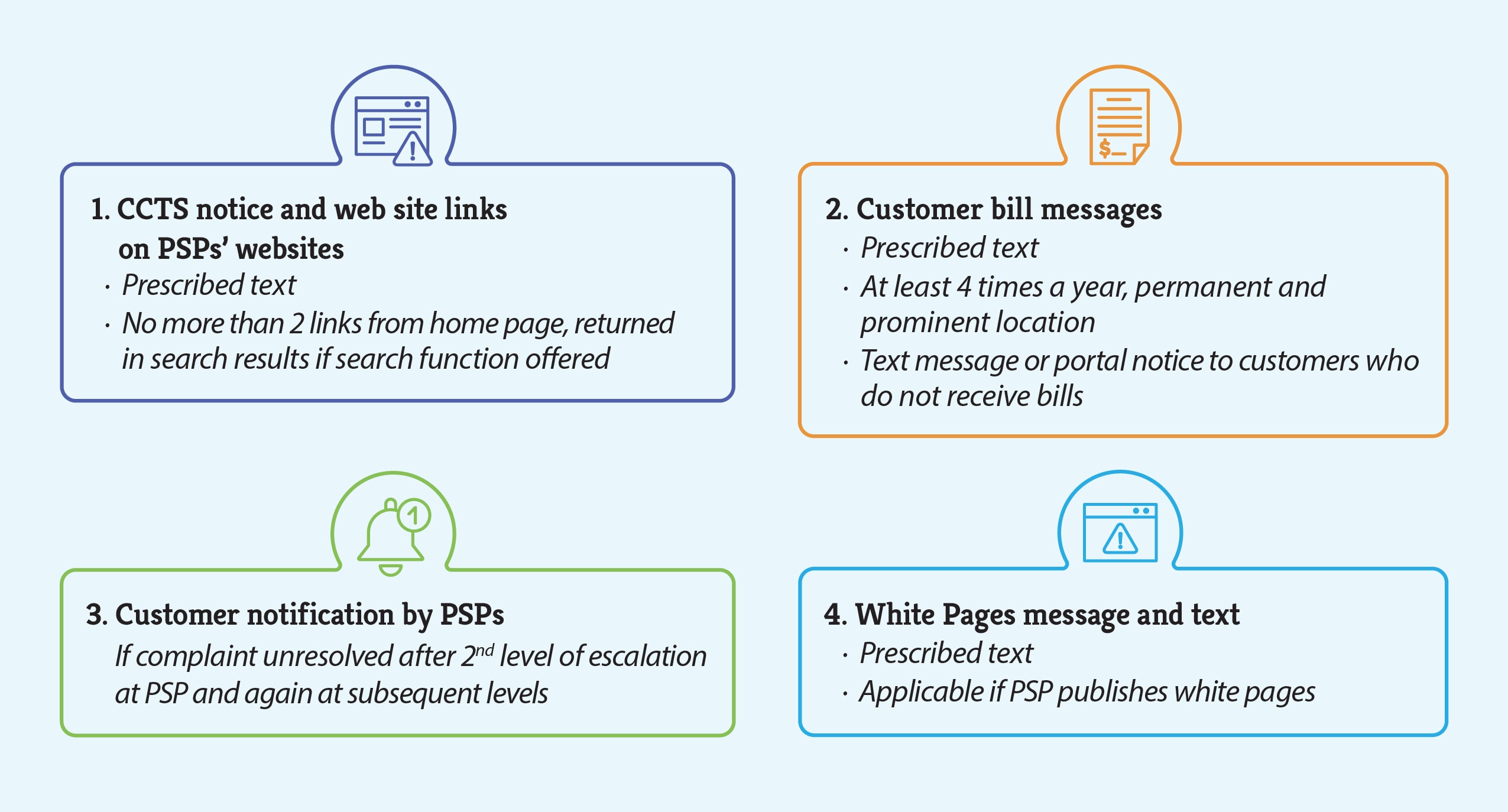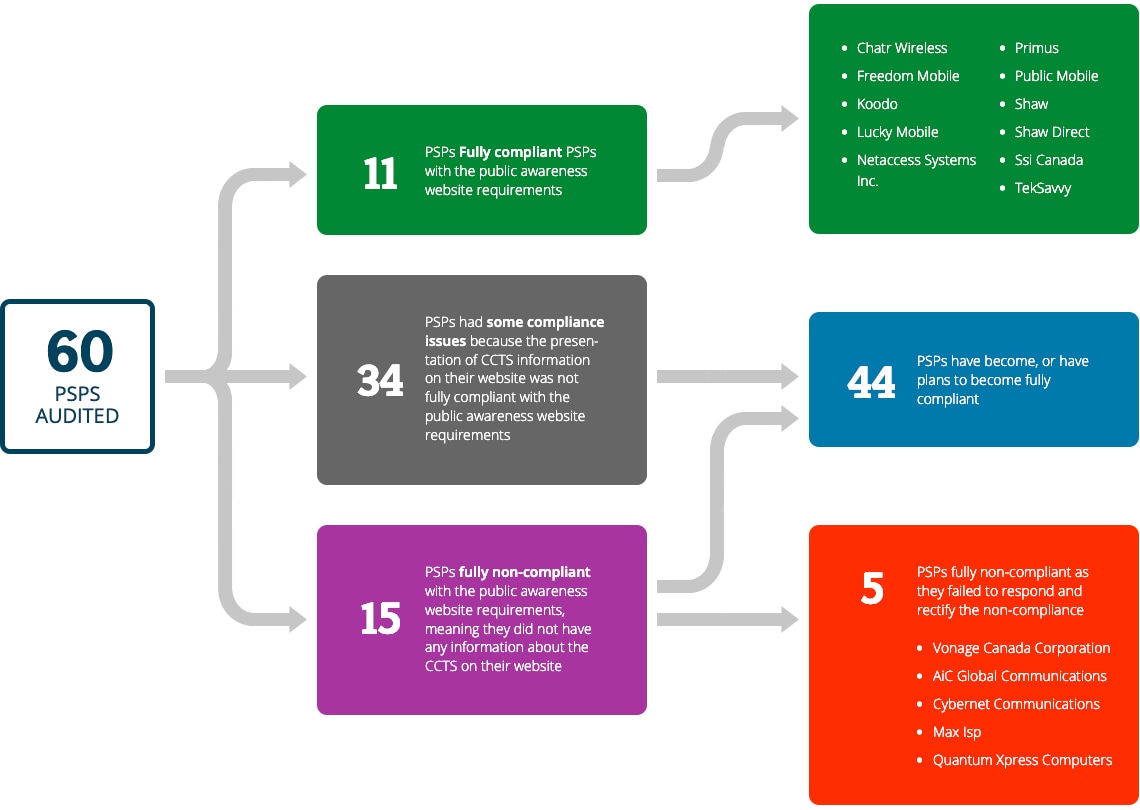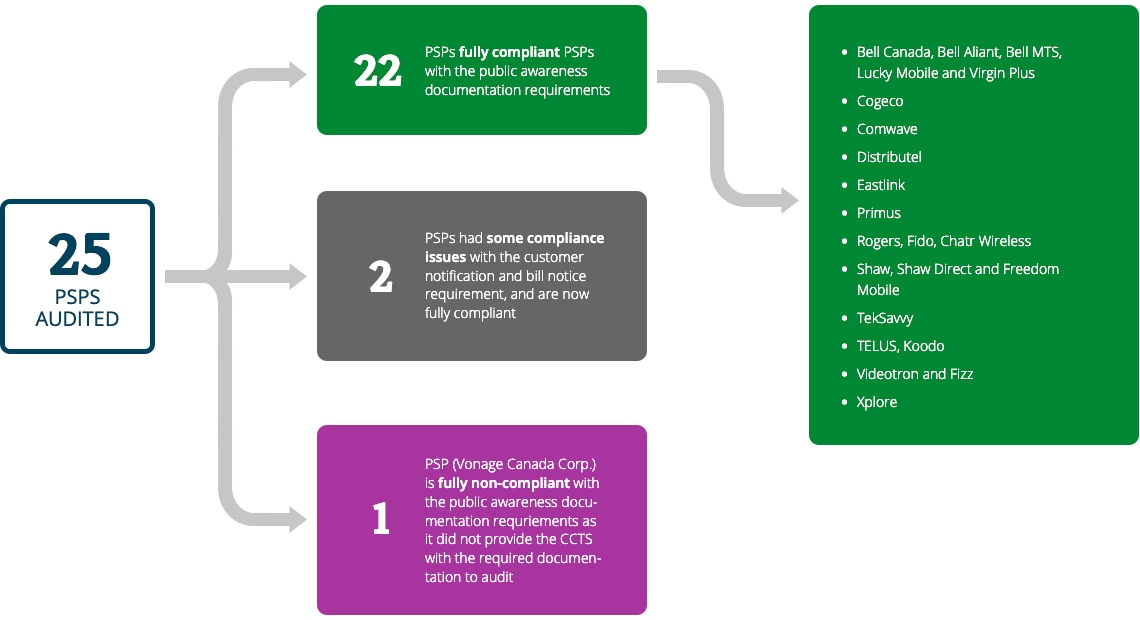Canadians need to be aware of, or be able to easily find out about, the CCTS when they need assistance in resolving disputes with their communications service providers. We take seriously the continuing need to ensure public awareness of the services that we provide.
The CCTS undertakes general public awareness activities, such as publishing our Annual and Mid-Year Reports, creating video content for our YouTube page, regular public newsletters, social media activities, and providing media outlets with information and data.
Participating service providers (PSPs) also contribute to building public awareness about the CCTS by carrying out the requirements of the CCTS’ Public Awareness Plan, “Developing Public Awareness of the CCTS”. PSP activities towards increasing awareness about the CCTS empowers customers and demonstrates PSP commitment to consumer protection.
While the level of public awareness about the CCTS is not yet where we would like it to be, our Compliance program plays an important role in ensuring that PSPs are doing their part to provide key information about recourse to the CCTS to their customers. Our Compliance team will continue to assess compliance with the PSP Public Awareness Plan, identify non-compliance and engage with PSPs to ensure that non-compliance issues are addressed in a timely manner. This year, we increased our engagement with non-compliant PSPs. As a result of our increased efforts, more PSPs became compliant with the PSP Public Awareness Plan to ensure that their customers have access to information about the CCTS.
Public Awareness Plan requirements for PSPs
PSPs have four types of requirements under the Public Awareness Plan:

See Appendix A which explains the steps that PSPs must take to promote public awareness about the CCTS.
Who and what we audited in 2022
In 2022, the CCTS audited 60 PSPs for compliance with the Public Awareness Plan. This included:
- The 25 PSPs that generated the most CCTS complaints in the previous year, as listed in the 2020-2021 Annual Report. These PSPs accounted for 94% of all accepted complaints.
- 3 PSPs identified as non-compliant in 2022. Throughout the year, the Compliance team engages with some PSPs for specific non-compliance issues requiring a more in-depth engagement.
- 32 randomly selected PSPs (previously unaudited). This category ensures that all PSPs, regardless of their size and compliance status, can be reviewed to determine their compliance with the Public Awareness Plan requirements. With this year’s audit, the CCTS has audited the websites of 183 PSP brands since 2018.
The CCTS carries out two types of Public Awareness Plan audits, depending on the category to which each PSP belongs:
- Website audits: The CCTS reviews websites of all PSPs it audits to ensure that all required information about the CCTS is available on the provider’s website.
- PSP documentation audits: The CCTS reviews invoices, white pages and internal PSP documents about the PSP’s complaint-handling process for the 25 PSPs that generated the most CCTS complaints.
The CCTS shares its audit results with each PSP. Where non-compliance is identified, the CCTS explains what is expected to become compliant. PSPs are required to respond to the CCTS within 30 days of receiving non-compliant results, explaining how and when any identified issues will be addressed. Our Compliance team continues to work with PSPs until all identified issues have been resolved and we name providers who refuse to comply in the Compliance Monitoring Report.
2022 Public Awareness Plan results
Website review – initial audit results
The CCTS audited 60 PSP websites in order to ensure their customers have access to the required website information, such as how the customer can contact the CCTS.

Working with PSPs to become compliant with website requirements
We worked with 49 PSPs individually to address the issues of non-compliance with the website requirements. Thirty-four PSPs have since addressed the compliance issues we raised, and 10 PSPs provided us with the details of how and when they will become compliant.
Five PSPs failed to respond to us and identify how they intend to comply with the Public Awareness Plan requirements: Vonage Canada Corporation, AiC Global Communications, Cybernet Communications, Max Isp and Quantum Xpress Computers. We will continue to engage these providers and review whether there are other issues of non-compliance.
Trends observed from website audits
In 2022, we found that nearly 30% of audited PSPs did not have any information about the CCTS on their websites. This is consistent with the results from 2020 (32%) and 2021 (28%).
The providers without information about the CCTS on their website in 2022 were small and new PSPs. We worked extensively with those providers and as a result, nearly 90% of audited PSPs now have added information about the CCTS on their website. Additionally, we plan on providing annual reminders to all PSPs about their obligations under the PSP Public Awareness Plan.
Although the majority of audited PSPs had information about the CCTS on their website prior to being audited, many of the issues we identified were about how and where the CCTS information was presented.
Trend #1. Majority of PSP complaints page do not contain information about the CCTS, and are not clearly labelled or easy to find
In 2022, the CCTS found that more than half of PSPs’ complaint pages did not contain information about the CCTS and were not clearly labelled or were not easy to find. Issues identified include:
- the PSP’s complaint page failing to include any information about the CCTS;
- hyperlinks to the complaints page were not clearly labelled because the words used were misleading or confusing, (e.g. such as “How to complain to us”, which implies the page is for complaining to the provider only and not to an independent agency);
- the CCTS information was buried in Terms of Service or the Privacy Policy;
- PSP’s business website failing to include any information about the CCTS, even though small business customers are eligible to file complaints with the CCTS.
The CCTS’ objective is to ensure customers can easily find information about the CCTS when they need it most – when they have a complaint about their services. Customers should not have to scour their PSP’s website to find information about the PSP’s complaint process and their right of recourse to the CCTS.
Each year, we continue to find it difficult to navigate to the PSP’s complaint page and to find information about the CCTS. It is a recurring issue throughout the industry and among individual PSPs. Each year between 2019-2022, approximately half of audited PSPs were non-compliant with this requirement.
After identifying non-compliance, we work with PSPs every year to ensure their complaint page is clearly labelled, easy to find and contains the CCTS information. Despite PSPs addressing their non-compliance each year, new instances of non-compliance occur each year. Between 2019 and 2022, there were 16 PSPs that were non-compliant with this requirement in multiple years. Three PSPs were non-compliant with the requirement for 3 out of 4 years. To address this, we issued a memo in 2022 providing further clarification for PSPs to ensure they understand what the CCTS considers to be “clearly labelled and easy to find”. This guidance helps PSPs understand how we assess compliance for this requirement so that they can avoid non-compliance in the future.
Trend #2: Improvement on positioning and context of CCTS information
Last year, we noticed a new issue with the way the CCTS notice was contextualized on some PSP websites and invoices. Specifically, the CCTS observed that some PSPs were:
- adding language on the website or positioning the CCTS message to indicate that a customer must exhaust a specific number of steps in the PSP’s internal complaint-handling process before they were permitted to complain to the CCTS; or
- listing on their websites or invoices certain subjects or issues as being out of scope for the CCTS.
The CCTS was concerned that the way PSPs were positioning and including information on their websites could leave customers with the inaccurate impression that the CCTS was not available to them, frustrating the objective of the Public Awareness Plan.
In response to this issue, the CCTS provided guidance to all PSPs in the 2021 Compliance Monitoring Report and in a memo explaining the issue and providing examples of compliant and non-compliant activity. We also engaged with the PSPs we identified as having the problem, to explain and address the issue.
This year, we were pleased to see that only two PSPs were non-compliant with this guidance initially, and those PSPs have now come into compliance after this issue was brought to their attention.
Trend #3. Majority of PSP websites with search function did not return the PSP complaint page
In 2022, 55% of PSP websites with a search function did not return results with a link to the complaints page with the CCTS information when searching for all keywords related to complaints and CCTS. This is an improvement compared to 2021, when over 70% of PSPs with a search function were non-compliant. However, in each of the four years that the CCTS has assessed compliance with the search function, more than half of PSPs’ search functions did not return a link to the complaint page with the CCTS information.
While reviewing the results from PSPs which are audited each year between 2019 to 2022, we found repeated non-compliance as 14 of the 19 PSPs audited year over year were non-compliant with the search function at least twice. Two of these PSPs were non-compliant with this requirement all four years.
Although each year these PSPs fixed the issue when the CCTS brought it to their attention after the annual audits, the errors recurred. PSPs explained to us that this is due to website changes implemented throughout the year.
Since our first annual compliance monitoring report, we’ve consistently identified the concern that many PSPs are non-compliant with the search function requirement. We should not have to remind PSPs each year to ensure their search function consistently returns the right results throughout the year. When PSPs update their website, they should take steps to verify that the required keywords continue to return the required CCTS information.
The rate of non-compliance is unacceptable and avoidable by PSPs through internal control processes for website updates. The search function is often the first tool that customers will use on a PSP website to find information on how to complain or the CCTS. Given the limited improvement and significant recurrence, the CCTS is considering naming PSPs that have recurring issues with the search function. We urge PSPs to implement internal processes and regular checks to ensure that website updates do not impact the search function.
Trend #4. Business websites do not contain information about the CCTS
PSPs are required to ensure that information about the CCTS is readily available to customers when they need it most. Customers, including small businesses, should be aware of their right to access the CCTS’ complaint resolution service. Therefore, PSPs with business websites are required to have information about the CCTS on their business websites. The CCTS found that 8 out of 26 PSPs with business websites were initially non-compliant with this requirement. Seven of those PSPs are now compliant or have provided us with their plan to become compliant. Vonage Canada Corporation, as discussed below, failed to rectify its non-compliance.
Since 2019, we have observed that some PSPs with dedicated business websites did not include information about the CCTS on their business complaint page. We sent out guidance to all PSPs on this issue in 2022. We will continue to specifically audit PSP small business webpages to ensure information about the CCTS is included.
For full results, see Appendix C. Public Awareness Plan website audit results.
Documentation Review
Documentation review – initial audit results
In 2022, the CCTS audited the invoices, white pages and internal complaint-handling process of the 25 PSPs that generated the most complaints in 2020-21 in order to determine whether they complied with their obligations under the Public Awareness Plan.
Nearly 90% of the 25 PSPs audited were fully compliant with all Public Awareness Plan documentation requirements and these PSPs did not need to make any changes. This is a significant improvement from 2021, where 64% of PSPs were initially compliant.

The non-compliance this year was due to:
- 1 PSP did not provide the required CCTS message on their invoices to customers and 1 PSP failed to provide the required CCTS message via text message to its wireless customers who do not receive an invoice. Following engagement, both PSPs have implemented measures to ensure they provide the required CCTS message to their customers going forward.
- Vonage Canada Corporation failed to provide us with the required documentation by the deadline despite extensive engagement efforts. We extended the deadline twice upon request for Vonage Canada Corporation to provide the required documentation and it did not. We followed up multiple times and it did not respond to our requests. Consequently, the CCTS has deemed Vonage Canada Corporation non-compliant for failure to comply with the request for information and the documentation requirements outlined in the Public Awareness Plan. Vonage Canada Corporation also failed to rectify the non-compliance issues on its website. We will continue to engage Vonage Canada and review whether there are other issues of non-compliance.
See Appendix D for full documentation audit results.
